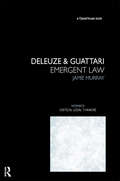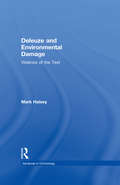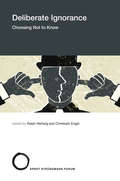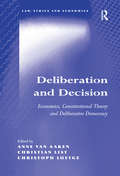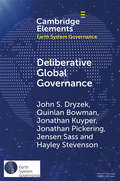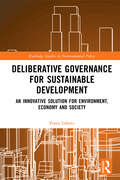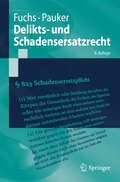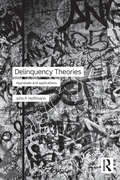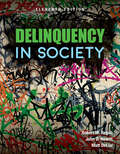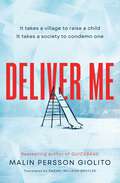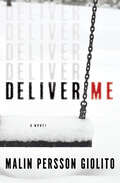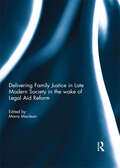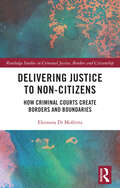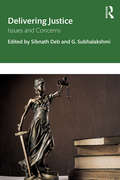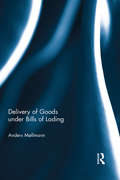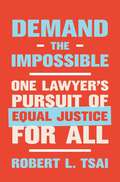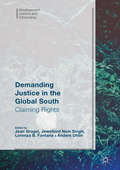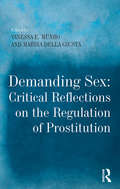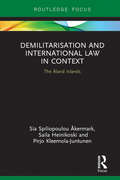- Table View
- List View
Delegation of Powers in the EU Legal System (Routledge Research in EU Law)
by Annalisa VolpatoThe majority of rules adopted at the EU level are not issued by democratically elected institutions, but rather by administrative bodies which are empowered to exercise rule-making powers by legislative acts. This book analyses the legal mechanism through which these powers are conferred on the most relevant bodies in the EU institutional landscape, namely the European Commission, the Council, the ECB and EU agencies, and the democratic controls in place to limit and oversee the exercise of these powers. Providing an overarching perspective of the delegation of powers, this book reflects on the notion of delegation and on the commonalities between the different forms of delegation identified. It focuses on the legal requirements and limits for the delegating act, the procedures for the exercise of such powers, the position of the acts in the hierarchy of norms, and their judicial review. Overcoming the fragmentation which characterized the development of the different forms of delegation in the EU, this analysis provides a clear, structured, and coherent picture of the legal framework for the delegation of powers in the light of the constitutional principles of this legal system. Academics and practitioners will equally appreciate this highly accessible addition to the current debate in legal scholarship of the delegation of powers in the EU, as well as its explanations on comitology and the empowerment of EU agencies.
Delete: The Virtue of Forgetting in the Digital Age
by Viktor Mayer-SchönbergerThe hazards of perfect memory in the digital ageDelete looks at the surprising phenomenon of perfect remembering in the digital age, and reveals why we must reintroduce our capacity to forget. Digital technology empowers us as never before, yet it has unforeseen consequences as well. Potentially humiliating content on Facebook is enshrined in cyberspace for future employers to see. Google remembers everything we've searched for and when. The digital realm remembers what is sometimes better forgotten, and this has profound implications for us all.In Delete, Viktor Mayer-Schönberger traces the important role that forgetting has played throughout human history, from the ability to make sound decisions unencumbered by the past to the possibility of second chances. The written word made it possible for humans to remember across generations and time, yet now digital technology and global networks are overriding our natural ability to forget—the past is ever present, ready to be called up at the click of a mouse. Mayer-Schönberger examines the technology that's facilitating the end of forgetting—digitization, cheap storage and easy retrieval, global access, and increasingly powerful software—and describes the dangers of everlasting digital memory, whether it's outdated information taken out of context or compromising photos the Web won't let us forget. He explains why information privacy rights and other fixes can't help us, and proposes an ingeniously simple solution—expiration dates on information—that may.Delete is an eye-opening book that will help us remember how to forget in the digital age.
Deleuze & Guattari: Emergent Law (Nomikoi: Critical Legal Thinkers)
by Jamie MurrayDeleuze & Guattari: Emergent Law is an exposition and development of Deleuze & Guattari's legal theory. Although there has been considerable interest in Deleuze & Guattari in critical legal studies, as well as considerable interest in legality in Deleuze & Guattari studies, this is the first book to focus exclusively on Deleuze & Guattari and law. Situating Deleuze & Guattari's engagement with social organisation and legality in the context of their theory of 'abstract machines' and 'intensive assemblages', Jamie Murray presents their theory of law as that of a two-fold conception of, first, a transcendent molar law and, second, an immanent molecular emergent law. Transcendent molar legality is the traditional object of legal theory. And, as explicated here, immanent molecular emergent law is the novel juridical object that Deleuze & Guattari identify. Developing this conception, Deleuze & Guattari: Emergent Law draws out its implications for current and for future legal theory; arguing that it provides the basis for a new jurisprudence capable of creating new concepts of legality.
Deleuze and Environmental Damage: Violence of the Text (New Advances in Crime and Social Harm)
by Mark HalseyThis book offers a post-structuralist critique of the problems associated with modernist accounts of environmental harm and regulation. Through a notably detailed micro-political analysis of forest conflict, the author explores the limits of academic commentary on environmental issues and suggests that the traditional variables of political economy, race and gender need to be recast in light of four key modalities through which 'the environment' and 'environmental damage' are (re)produced. Focusing on vision, speed, lexicon and affect, the book engages a new ethic for categorizing and regulating 'nature' and challenges criminologists, sociologists, cultural theorists and others to reconsider what it is possible to say and do about environmental problems.
Deleveraging after Lehman--Evidence from Reduced Rehypothecation
by Manmohan Singh James AitkenA report from the International Monetary Fund.
Deliberate Ignorance: Choosing Not to Know (Strüngmann Forum Reports #29)
by Ralph Hertwig Christoph EngelPsychologists, economists, historians, computer scientists, sociologists, philosophers, and legal scholars explore the conscious choice not to seek information.The history of intellectual thought abounds with claims that knowledge is valued and sought, yet individuals and groups often choose not to know. We call the conscious choice not to seek or use knowledge (or information) deliberate ignorance. When is this a virtue, when is it a vice, and what can be learned from formally modeling the underlying motives? On which normative grounds can it be judged? Which institutional interventions can promote or prevent it? In this book, psychologists, economists, historians, computer scientists, sociologists, philosophers, and legal scholars explore the scope of deliberate ignorance.
Deliberation and Decision: Economics, Constitutional Theory and Deliberative Democracy (Law, Ethics and Economics)
by Christian List Anne van AakenDeliberation and Decision explores ways of bridging the gap between two rival approaches to theorizing about democratic institutions: constitutional economics on the one hand and deliberative democracy on the other. The two approaches offer very different accounts of the functioning and legitimacy of democratic institutions. Although both highlight the importance of democratic consent, their accounts of such consent could hardly be more different. Constitutional economics models individuals as self-interested rational utility maximizers and uses economic efficiency criteria such as incentive compatibility for evaluating institutions. Deliberative democracy models individuals as communicating subjects capable of engaging in democratic discourse. The two approaches are disjointed not only in terms of their assumptions and methodology but also in terms of the communication - or lack thereof - between their respective communities of researchers. This book provides a comprehensive overview of the recent debate between the two approaches and makes new and original contributions to that debate.
Deliberative Global Governance (Elements in Earth System Governance)
by Hayley Stevenson John S. Dryzek Quinlan Bowman Jonathan Kuyper Jonathan Pickering Jensen SassGlobal institutions are afflicted by severe democratic deficits, while many of the major problems facing the world remain intractable. Against this backdrop, we develop a deliberative approach that puts effective, inclusive, and transformative communication at the heart of global governance. Multilateral negotiations, international organizations and regimes, governance networks, and scientific assessments can be rendered more deliberative and democratic. More thoroughgoing transformations could involve citizens' assemblies, nested forums, transnational mini-publics, crowdsourcing, and a global dissent channel. The deliberative role of global civil society is vital. We show how different institutional and civil society elements can be linked to good effect in a global deliberative system. The capacity of deliberative institutions to revise their own structures and processes means that deliberative global governance is not just a framework but also a reconstructive learning process. A deliberative approach can advance democratic legitimacy and yield progress on global problems such as climate change, violent conflict and poverty.
Deliberative Governance for Sustainable Development: An Innovative Solution for Environment, Economy and Society (Routledge Studies in Environmental Policy)
by Franz LehnerDeliberative Governance for Sustainable Development argues that governance has become the core problem of sustainable development and identifies deliberative democracy and governance as a path forward for Western societies. In this book the author puts forward three messages. Firstly, while sustainable development theoretically is a common good of all people, it is in practice constantly associated with a multitude of smaller and larger conflicts. These conflicts arise repeatedly because, in practice, the benefits, costs and risks of sustainable development are unequally distributed and therefore form a massive barrier to sustainable development. As a result, sustainable development depends on the ability of the social and political institutions of societies to accommodate these conflicts. Second, within the framework of their established institutional structures, Western societies do not have the sufficient tools for conflict resolution that are adequate to the conditions of modern diversified societies and the complex challenges of sustainable development. They need to implement institutional reforms that switch institutional structures towards deliberation. Third, by switching to deliberation, Western societies can reach the high level of governance that enables them to achieve environmentally sustainable development that will bring them significant economic and social benefits and, as a result, may reach far beyond their borders. This volume offers a novel, transdisciplinary approach to sustainable development and governance in Western societies. It will be of great interest to students and scholars of sociology, economics, politics, environmental studies and philosophy, as well as professionals and policymakers working in the area of sustainable development.
Delikts- und Schadensersatzrecht
by Maximilian Fuchs Werner PaukerWie kaum ein anderes Rechtsgebiet des BGB sind das Deliktsrecht und das Schadensersatzrecht von der Rechtsprechung geprägt. Darum werden die wichtigsten Entscheidungen mit Sachverhalt und Entscheidungsgründen berücksichtigt. Damit bietet das Lehrbuch eine lebendige Erörterung des Stoffes. Rechtsprechung und Literatur wurden gegenüber der Vorauflage umfassend ausgewertet und aktualisiert.
Delinquency & Juvenile Justice in American Society
by Randall G. SheldenExtensively revised, the second edition blends theory, research, and applications into a superb overview of the complex issues surrounding juvenile delinquency and society’s attempts to address juvenile crime. After providing an excellent historical foundation, Shelden presents the theories essential to understanding crime and delinquency. He then explores the system and its effects on juveniles and society, including comprehensive coverage of female delinquency. The social, legal, and political influences on how the public perceives juveniles and the inequality in U.S. society that affects families, communities, and schools are highlighted throughout the book. The concluding chapter looks at solutions that have worked and identifies trends in treating juvenile delinquency. The author’s almost four decades of teaching about and researching juveniles and the system make him eminently qualified to offer readers the tools necessary to think critically about delinquency and to evaluate the policies enacted to manage the juveniles who violate the laws. Delinquency and Juvenile Justice in American Society, 2/E provides affordable, up-to-date, easily accessible, and thorough analysis of a significant topic.
Delinquency Theories: Appraisals and applications
by John P. HoffmannDelinquency Theories: Appraisals and applications provides a fulsome and accessible overview of contemporary theories of juvenile delinquency. The book opens with a comprehensive description of what a theory is, and explains how theories are created in the social sciences. Following on, each subsequent chapter is dedicated to describing an individual theory, broken down and illustrated within four distinct sections. Initially, each chapter tells the tale of a delinquent youth, and from this example a thorough review of the particular theory and related research can be undertaken to explain the youth’s delinquent behaviour. The third and fourth sections of each chapter critically analyze the theories, and provide a straightforward discussion of policy implications of each, thus encouraging readers to evaluate the usefulness of these theories and also to consider the relationship between theory and policy. This text is an invaluable resource for both undergraduate and graduate students of subjects such as youth justice, delinquency, social theory, and criminology.
Delinquency in Society
by null Robert M. Regoli null John D. Hewitt Null Matt DeLisiDelinquency in Society, Eleventh Edition provides in-depth, research-oriented coverage of the essential delinquency topics and theories, including juvenile delinquency, criminal behavior, and status-offending youths. With high quality photos, images, and learning features throughout, the updated Eleventh Edition continues to showcase the most current research and practice to prevent, treat, and respond to juvenile delinquency in an approachable design and clear writing style. The Eleventh Edition features unparalleled historical coverage of criminological theory based on over 100 years of cumulative teaching and research experience by the authors. New sections on hot topics, including health criminology, vaping and its association with delinquency, adverse childhood experiences, the expansion of NIBRS in measuring delinquency, and more timely discussions, help to make the best-selling Delinquency in Society the clear choice for delinquency courses.
Deliver Me
by Malin Persson GiolitoFrom the internationally bestselling author of Quicksand, a brilliant, gut-wrenching story of childhood friends torn apart by gang violence and class differences. Dogge is from affluent Rönnviken in Stockholm. Billy lives in the concrete towers of Våringe, a few hundred yards across a highway but a world apart. They met as six-year-olds at Rönnviken&’s playground and have been unlikely best friends ever since. From the outside, Dogge looks privileged: he lives in a large home and there is plenty of money—at first. But his parents are addicts whose negligence becomes a form of abuse. Meanwhile, Billy&’s family are poor first-generation immigrants unable to escape the no-go zone where they live. But their cramped apartment is nonetheless a bastion of love. When gangs tighten their grip on Våringe, a ruthless small-time boss seeks recruits and both Dogge and Billy become runners by the time they&’re twelve. Fast cash, easy access to drugs, and the dream of gaining status draw them in. But when Billy wants to leave the gang and finds himself trapped, the boys must face the violent rules of the adult game they tried to play.When children commit horrible crimes, who bears the responsibility? With piercing prose and a breathless sense of urgency, Deliver Me is at once a poignant portrayal of the power of friendship and a shattering depiction of what happens when society fails to protect those that need it most. What does justice mean for these lost children and is the law capable of delivering it?PRAISE FOR MALIN PERSSON GIOLITO: 'Sensitive, moving and absorbing' Marcel Berlins, The Times 'This is the evolution of Scandinavian crime, in more ways than one' Fredrik Backman 'Compelling and brutally candid . . . superbly told' Daily Mail 'Suspenseful and addictive' Real Crime 'Splendid' Kirkus Reviews 'Haunting and immersive' Publishers Weekly
Deliver Me: A Novel
by Malin Persson GiolitoScandinavian noir meets legal thriller in this brilliant, gut-wrenching story of childhood friends torn apart by gang violence and class differences in Stockholm—from the internationally bestselling author of Quicksand.Unlikely best friends since the age of 6, Billy and Dogge live in suburbs separated only by a highway, yet a world apart. From the outside, Dogge looks privileged: his family has a large home and plenty of money—at first. But his parents are addicts whose negligence becomes a form of abuse. Meanwhile, Billy&’s family are poor first-generation immigrants unable to escape the no-go zone where they live, but their cramped apartment is nonetheless a bastion of love. A ruthless small-time crime boss seeks recruits, and both Dogge and Billy become runners by the time they&’re 12. Fast cash, easy access to drugs, and dreams of gaining status draw them in. But when Billy wants to leave the gang and finds himself trapped, the boys must face the violent rules of the adult game they tried to play. When children commit horrible crimes, who bears the responsibility? With piercing prose and a breathless sense of urgency, Deliver Me is at once a poignant portrayal of the power of friendship and a shattering depiction of what happens when society fails to protect those that need it most. What does justice mean for these lost children, and is the law capable of delivering it?
Delivering Family Justice in Late Modern Society in the wake of Legal Aid Reform
by Mavis MacleanLegal aid for family cases in private law, mainly divorce and separation, where the state is not directly involved as it is in public law cases where there are issues of domestic violence or neglect or abuse of children, came to an abrupt end together with help for welfare and immigration cases on April 1 2013 when the Legal Aid Sentencing and Punishment of Offenders Act (LASPO) came into effect. This book presents an account of the wide ranging problems which the researchers and practitioners expected to ensue. Sadly, their fears have been realised in many areas of legal help and advice. The National Audit Office was to take the view in 2014 that although the Ministry of Justice had succeeded in making considerable savings in the cause of austerity that they had failed to investigate or understand the impact of these cuts on the individuals concerned and society as a whole. This book was previously published as a special issue of the Journal of Social Welfare and Family Law.
Delivering Justice to Non-Citizens: How Criminal Courts Create Borders and Boundaries (Routledge Studies in Criminal Justice, Borders and Citizenship)
by Eleonora Di MolfettaHow does justice for non-citizens look like? This book provides a nuanced cross-section of how criminal courts deliver justice to non-citizens, investigating rationales and purposes of penal power directed at foreign defendants. It examines how lack of citizenship alters the contours of justice, creating a different system oriented at control and exclusion of non-members. Drawing on ethnographic research in an Italian criminal court, the book details how citizenship and national belonging not only matter, but are matters reproduced, elaborated, and negotiated throughout the judicial process, exploring the implications of this development for the understanding of penal power and the role of criminal courts.Set in the context of the growing intersection between migration control and penal power, Delivering Justice to Non-Citizens explores whether and how instances of border control have seeped into judicial practices. In doing so, it fills a significant gap in the scholarship on border criminology by considering a rather unexplored actor in the field of migration studies: criminal courts. Based on a year of courtroom ethnography in Turin, Delivering Justice to Non-Citizens relies on interviews with courtroom actors, courthouse observations, analysis of court files, together with local media analysis, to provide a vivid image of judicial practices towards foreign defendants in a medium-size criminal court. It considers and balances the distinctive traits of the local context with ongoing global processes and transformations and adds much needed insights into how global processes impact local realities and how the local, in turn, adjusts to global challenges. Through instances of everyday justice, the book calls attention to how migration control has silently seeped into the judicial realm.The book will be of interest to students and academics in sociology, criminology, law, penology, and migration studies. It will also be an important reading for legal practitioners, magistrates, and other law enforcement authorities.
Delivering Justice: Issues and Concerns
by Sibnath Deb; G. SubhalakshmiThis book critically analyzes emerging issues and challenges in delivering timely justice to common people. It brings a wide range of contemporary and relevant issues relating to the gross violation of human rights and presents situation-based evidence from, and first-hand experiences of, behavioral, social and legal professionals. It deals with themes such as holding administrations accountable and securing justice, challenges for the judiciary in the early disposal of cases, challenges to the forensic community, green federalism and environmental justice, current threats to human rights, ethics in the criminal justice system and honor killing from socio-cultural perspectives. Topical and comprehensive, this book will be an excellent read for scholars and researchers of political studies, legal studies, human rights, psychology, behavioural studies, political sociology, sociology, development studies, governance and public policy, environmental studies and South Asian studies. It will also interest policymakers, nongovernmental organizations, activists and professionals in the field.
Delivering Police Services Effectively (Advances in Police Theory and Practice #27)
by Garth den HeyerThis book addresses the various strategies that are available to police management, such as consolidation, regionalization, and amalgamation of police agencies; new public management (NPM); enhanced performance management; civilianization; and organizational restructuring. It fills the gap in the research as to how police agencies have reacted to the environmental and fiscal changes since the 1980s. The book examines the strategies employed and the effect on police and their delivery of service.
Delivery of Goods under Bills of Lading
by Anders MøllmannProbably the core characteristic of a bill of lading is that the original bill of lading must be presented at the port of destination for a consignee to be entitled to delivery of the goods and for the carrier to get a good discharge of its delivery obligation by delivering the goods to said consignee. This notion is accepted virtually worldwide, but the more precise content of the "presentation rule" differs from jurisdiction to jurisdiction. Furthermore, and of importance, the legal basis establishing the "presentation rule" differs. With the technological advances in maritime transport as well as in communications technology and the emergence of more complicated trading patterns, a system where a specific tangible piece of paper issued at the port of loading has to be presented at the port of discharge to obtain delivery of the goods seems almost archaic and can obviously create problems. Thus, in practice very often – especially in some trades such as the oil trade – the bill of lading is not available at the port of discharge when the ship is ready to deliver the cargo. The book will first analyse the "presentation rule", its finer contents and its legal basis. It will then go on with (legal) analyses of three developments and responses to the problems that the bill of lading system gives rise to in practice, viz. the commercial, the international legislature’s, and the technological response. The commercial response analysed here consists of contractual exemption or limitation clauses in the bill of lading set up as a defence against claims for misdelivery. The international legislature’s response denotes the adoption of the Rotterdam Rules which as the first international convention on carriage of goods by sea includes elaborate rules on delivery of the goods. Finally, the technological response denotes the possibility of using electronic (equivalents of) bills of lading. The analyses will include a comparative approach examining both English and Scandinavian law to elucidate the issues with greater clarity.
Demand the Impossible: One Lawyer's Pursuit Of Equal Justice For All
by Robert L. TsaiHow four Supreme Court cases in recent years—all argued and won by one indomitable lawyer—are central to the pursuit of equal justice in America. Stephen Bright emerged on the scene as a cause lawyer in the early decades of mass incarceration, when inflammatory politics and harsh changes to criminal justice policy were crashing down on the most vulnerable members of society. He dedicated his career to unleashing social change by representing clients that society had long ago discarded, and advocated for all to receive a fair trial. In Demand the Impossible, Robert L. Tsai traces Bright’s remarkable career to explore the legal ideas that were central to his relentless pursuit of equal justice. For nearly forty years, Bright led the Southern Center for Human Rights, a nonprofit that provided legal aid to incarcerated people and worked to improve conditions within the justice system. He argued four capital cases before the US Supreme Court—and won each one, despite facing an increasingly hostile bench. With each victory, he brought to light how the law itself had become corrupted by the country’s thirst for severe punishment, exposing prosecutorial misconduct, continuing racial inequality, inadequate safeguards for people with intellectual disabilities, and the shameful quality of legal representation for the poor. Organized around these four major Supreme Court cases, each narrated in vivid and dramatic detail, Tsai’s essential account explores the racism built into the criminal justice system and the incredible advancements one lawyer and his committed allies made for equal rights. An electrifying work of legal history, Demand the Impossible reveals how change can be won in even the most challenging times and how seemingly small victories can go on to have outsized effects.
Demanding Justice in The Global South
by Jean Grugel Anders Uhlin Jewellord Nem Singh Lorenza FontanaThe politics of claiming rights and strategies of mobilisation exhibited by marginalised social groups lie at the heart of this volume. Theoretically, the authors aims to foster a holistic and multi-faceted understanding of how social and economic justice is claimed, either through formal, corporatist or organised mechanisms, or through ad hoc, informal, or individualised practices, as well as the implications of these distinctive activist strategies. The collection emphasises both the difficulties of political mobilisation and the distinctive methods employed by various social groups across a variety of contexts to respond and overcome these challenges. Crucially, the authors' approach involves a conceptualisation of social movements and local mobilisation in terms of the language of rights and justice claims-making through more organised as well as everyday political practices. In so doing, the book bridges the literature on contentious politics, the politics of claiming social justice, and everyday politics of resistance.
Demanding Sex: Critical Reflections On The Regulation Of Prostitution
by Marina Della GiustaInterrogating supply/demand from an inter- and multi-disciplinary perspective, this collection broadens engagement beyond the routine analysis of the locus of violence in prostitution and the validity of the prostitute's consent. A focus on the supply/demand dynamic brings into play a range of other societal, economic and psychological factors such as the social construction of sexuality, the viability of alternative choices for prostitutes and clients, and the impact of regulatory regimes on the provision of sexual services. The factors which underlie each component of the supply/demand dyad are also studied and an examination is made of their dynamic interrelation. The collection emphasizes the importance of rendering policy makers alert to the evidence emerging from empirical studies conducted in different fields of enquiry, in the hope of moving beyond polarity and politics at the local, national and international level.
Dementia Lab 2025: Proceedings of the 7th Dementia Lab Conference, D-Lab 2025, March 13–14, 2025, Aveiro, Portugal (Design For Inclusion #5)
by Claire Craig Rita Maldonado Branco Daniela Figueiredo Amber De CoenThis is an open access book. It gathers revised and selected contributions to the 7th Dementia Lab Conference, D-Lab 2025, held on March 13–14, 2025, in Aveiro, Portugal, reporting on innovative research aimed at improving the lives of people with dementia, their loved ones, and their caregivers. This edition addresses the theme of ethics + aesthetics in design. Ethics emphasize justice, advocate for inclusive, person-centred practices, and challenge societal stigmas. Aesthetics, beyond beauty, focus on sensory and emotional engagement, which becomes increasingly significant as dementia progresses. Together, these principles guide innovative design approaches that enhance care, identity, and connection. Being organized into three themes, Designing with People with Dementia, Including Design in Dementia Care, and Design within Cultures of Care, this collection highlights research on participation, technology, and the cultural dimensions of care. It also demonstrates the key role of design in creating products and environments that embrace aesthetic value and is expected to challenge stigmas and unrealistic assumptions about people living with dementia
Demilitarization and International Law in Context: The Åland Islands (Routledge Research in International Law)
by Sia Spiliopoulou Åkermark Saila Heinikoski Pirjo Kleemola-JuntunenThe demilitarisation and neutralisation of the Åland Islands is a confirmation of, and an exception to, the collective security system in present-day international affairs. Its core idea is that there is no need for military presence in the territory of the islands and that they are to be kept out of military activities. A restricted use of military force has a confidence building effect in cases where competing interests may be so intense that banning the very presence of military force remains the only viable option. The regime of the Åland Islands is the result of pragmatic and contingent political compromises. As such, the case of the Åland Islands offers an alternative trajectory to the increased militarisation we witness around the world today. Through parliamentary and archival materials, international treaties and academic works, the authors examine the legal rules and institutional structures of the demilitarisation regime. In this process they reassess core concepts of international law and international affairs, such as sovereignty and security, and introduce a theoretical view on the empirical case study of the Åland Islands. The book covers legal, political and policy discursive aspects of demilitarisation, international co-operation, defence and security matters around the Baltic Sea with a broader European and global relevance. It can be a source of inspiration for all those in search of constructive efforts that can address territorial disputes and security challenges.


